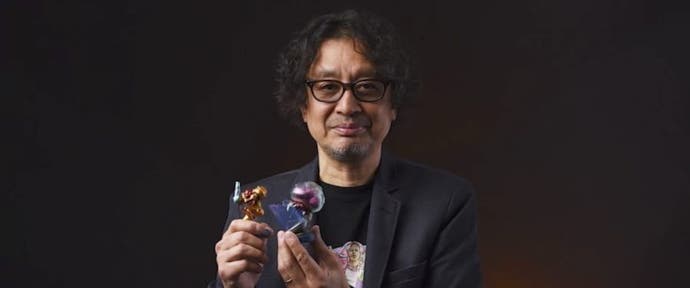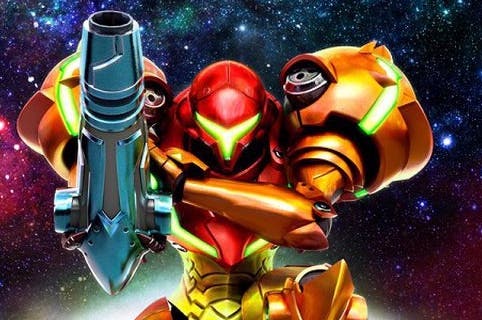Returning to Metroid
Co-creator Sakamoto on Samus Returns, Prime 4, amiibo and more.
Yoshio Sakamoto worked at Nintendo before he co-created Metroid, but it was his sci-fi series - one that that spawned a whole genre - which made him famous.
Along with the late Gunpei Yokoi, Sakamoto developed Metroid for NES. He had already cut his teeth on classic such as Balloon Fight and Donkey Kong Jr. The same year as Metroid, he also shipped Kid Icarus.
But it was Metroid which stuck, and Metroid which received a sequel in 1991: Metroid 2, the game which Nintendo is now readying for re-release on 3DS in the shape of souped-up remake Metroid: Samus Returns.
Samus Returns will not only be the first mainline Metroid game to release in seven years, it will be the first traditional, purely side-scrolling Metroid to launch since before the series' resurgence as a 3D first-person shooter - otherwise known as the Metroid Prime trilogy.
Meeting Sakamoto at Gamescom 2017 this week I was keen to discuss both the birth of Samus Returns but also the current situation of the franchise in general - including the Metroid Prime subseries, which is also returning. Sakamoto oversees the main Metroid series, but is nothing to do with Prime games, which are overseen by producer, Kensuke Tanabe. In the interview below, we discuss this - although Sakamoto does not refer to Tanabe by name.
I also asked Sakamoto about the recent furore over amiibo unlocks for Samus Returns: the need for four figurines to unlock everything in the game, although the base game still includes a Hard Mode as standard. Finally, I took the chance to ask about the future of Rhythm Heaven, another series Sakamoto has helped create.
Was it difficult to add to Metroid 2 after so long?
Yoshio Sakamoto: Normally when you have a game which has its own completed boundaries, it is difficult to make additions. For this game, many of these new additions came from MercurySteam. And, thanks to their knowhow, their additions have been very effective. I can't emphasise enough that the integration of the old with the new went smoothly thanks to MercurySteam's fundamental understanding of the Metroid series, as well as the knowledge and sensibilities that come with that understanding.
However it wasn't our mindset to make these changes for beginners in particular - when we make the game in general we are trying to make it so anyone can play it, whether or not they have played past games.

How did MercurySteam and Nintendo come to work together? How did that partnership begin?
Yoshio Sakamoto: For some time, I've wanted to take on the challenge of remaking Metroid 2. When considering the development I had to think about which team or partnership would be suitable. Around that time I heard MercurySteam wanted to take on the challenge of making a Metroid game. That's why I decided to meet them and also because, seeing their past work, I knew they had the talent and the knowhow to make a 2D scrolling game.
So I went to Spain and, discussing the project, I felt they really understood the series and that we could build a strong partnership to take on the project together. And, seeing their prototype, they managed to surpass my expectations which were already very high. Even in the very minute details they could get things right without me mentioning anything. I felt safe delegating to them and partnering up for this challenge.
What in particular about the prototype was it that surprised you?
Yoshio Sakamoto: The first thing that surprised me is how well the controls worked. They were smooth, swift - it matched very well to the Metroid gameplay - even surpassing the controls we've had in the past. While this game is based on the level design of Metroid 2, there were many changes made. I was really impressed. I asked the game director, who designs the levels, if he had told them to do this or that. And he said no, it was MercurySteam.
So yes, two factors - a smooth game control which fitted Metroid, and the ability to propose level design which fitted and yet was fresh at the same time. It's something which is really difficult when you think of it, and yet they did it in such a short time.
There's new abilities in here too from other, later Metroid games as well, right?
Yoshio Sakamoto: There are several abilities which came out after Metroid 2 which have been implemented in Samus Returns - for example, the Grapple Beam. Also Power Bombs, and Super Missiles. I believe we'll provide you with a more exciting experience.
This is the first Metroid from a truly independent external developer. Will we see this continue?
Yoshio Sakamoto: I don't really think of things as internal or external. What's important for me is we have a good chemistry with whoever develops the game, that they have a good understanding of the series and have the ability to add things which constitute improvements. Of course, when you deal with a partner you're not familiar with, you're not sure at the beginning if things will go well. However, if they go well, they go well. I feel our partnership was meant to be. When you have a team which is external but also from overseas, they have an even more refreshing perspective and the kind of challenges I want to keep my mind open to as well.
For Metroid Prime as well?
Yoshio Sakamoto: For Metroid Prime, I'm not in charge of that series - another producer is handling it. But generally speaking I think they look at their teams from the same basic perspective.
There's been a lot of discussion about the game's amiibo and how to get everything in the game you require four amiibo. Four is quite a few. Some fans have said four is too many. Is it too many?
Yoshio Sakamoto: From our perspective, that isn't the mindset we have towards them. Please don't forget that, out of the four, two are Smash Bros.-related figurines. We have two new ones, but we've enabled users who have the two older ones to take advantage of them. To clarify, you don't need amiibo to unlock hard mode. When you clear the game, everyone has access to the hard mode.
So for our fans who purchase the respective figurine, fans will get a harder challenge. I think we have a lot of fans, and for the fans who purchase our amiibo out of love for our series, in addition to having a beautiful figurine, we wanted to give them something in exchange. Namely, to be able to unlock the Fusion Mode, which is even harder than hard mode.
Which brings me onto my next question, how much harder than Hard Mode is Fusion Mode?
Yoshio Sakamoto: I can't really get into the details, but I can say Fusion Mode is significantly more difficult than Hard Mode. Sorry I can't go into more detail, but I want fans to experience it for themselves.
Well, a very hard mode would be to remove all the save stations...
Yoshio Sakamoto: There will be save stations... the nature of the difficulty isn't that form, it's more how much damage will be inflicted, and the like.
I wanted to ask you about Rhythm Heaven, another game series you've worked on. There was a recent report there would be no more Rhythm Heaven - is this true?
Yoshio Sakamoto: We generally don't comment on those kind of rumours, but I don't remember us ever saying it was over. Generally speaking, if there's an oppurtunity, a motivation, a need, we consider all opportunities and leave the door open. That's all I can say.
So you wouldn't say it was dead?
Yoshio Sakamoto: No, it's not dead.
Nintendo announced two Metroid games at E3 - like busses, you wait for years for one then two come along at once. Do you talk with the developers on Prime 4 since you're in development at the same time on the same franchise?
Yoshio Sakamoto: Firstly I would say that the announcement of both games at the same time was basically a coincidence.
A happy coincidence?
Yoshio Sakamoto: [Laughs] We didn't try to match together, and I think we started earlier than them. But perhaps that producer was influenced to stimulate his own side. Generally he lets me know what he's intending to create - and he did let me know. We didn't want the development to be constrained by chronological riguer - it's important the game is fun. So for us, I try to respond to reply to him with an open mind so they can let loose their creativity. That said, we don't want to create a Metroid which is completely inconsistent so we do keep things reasonable. But we are both quite experienced at making these now.
You must feel a sense of ownership over Metroid. Do you feel this is a different branch to Metroid Prime, that they are quite separate?
Yoshio Sakamoto: That's quite difficult to answer. My experience of Metroid is the 2D type, so I would say they are quite different games. That said, whether a Metroid game is 2D or FPS, it's more about the ability for Metroid fans to have a blast and enjoy the game. And the more they do that, the better.
Is the timing of revisiting Metroid 2 now deliberate? We've had a few games which were quite different - Federation Force was a spin-off, even Other M had its huge focus on story.
Yoshio Sakamoto: I didn't really think about the timing! I'm always thinking about making a new Metroid game, and I've wanted to work on a remake of Metroid 2. Somehow, various conditions were met and I saw the oppurtunity and I grabbed it.
Do you have any idea where the series' story might go in the future, what might happen?
Yoshio Sakamoto: It's a tricky question to answer about the future. [Regardless], the Metroid series is not over [laughs]
Will Samus ever defeat all the Metroids?
Yoshio Sakamoto: What would you prefer? Once she does, there would be no more Metroid [laughs]
I'd prefer more Metroid games [laughs]. Would you like to revisit the kind of storytelling from Other M, which was a lot more character-focused?
Yoshio Sakamoto: That had a different narrative and it's own expression of a Metroid game. Right now we don't have any plans to reiterate the same approach. It's important we keep making something which is new and refreshing to keep the exciting for the series. And to use the past to keep things refreshing rather than get bogged down and simply reproducing the past.
What would you like to make next? Another remake or a fresh title?
Yoshio Sakamoto: We've just made a full-fledged remake so I'd rather take on something new. That's my general approach, and this was a new challenge.
Not limited to the Metroid series, I'm also considering completely new avenues. I can just say I'm thinking about it - and I'll keep the rest as a surprise!



